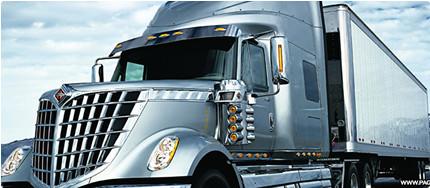Review Questions - Click On The Picture To Begin...

- When you are relieved of all duty and responsibility for performing work
- Time spent doing paid work for anyone who is not a motor carrier
- Anytime you aren't driving
- Time inspecting or servicing your truck
Quote From The CDL Manual:
What Is Off Duty Time
By understanding the definition of on duty time, you will get a good idea of what is considered off duty time. In order for time to be considered off duty, you must be relieved of all duty and responsibility for performing work. You must be free to pursue activities of your own choosing and be able to leave the place where your vehicle is parked.
If you are not doing any work (paid or unpaid) for a motor carrier, and you are not doing any paid work for anyone else, you may record the time as off duty time.
Personal Use Of A Commercial Motor Vehicle
It is possible that occasionally you may not use a truck in commerce at all. You may be moving your personal belongings to a new house or, as a hobby you may be taking your horses to a horse show. As long as the activity is not in support of a business, you are not operating in commerce.
If you are not operating your truck in commerce, you are not subject to the hours of service regulations.
TruckingTruth's Advice:
As long as you aren't doing anything related to your job and you aren't earning any sort of compensation from anyone, you can log off duty. You also must be completely relieved of all duty and responsibility for performing work.
- All of these are considered on duty time
- All time loading and unloading your truck
- All time inspecting or servicing your truck, including fueling
- All driving time
Quote From The CDL Manual:
What Is Considered On Duty Time?
The 60 / 70 hour limit is based on how many hours you work over a 7 or 8 day period. Just what kind of work is considered on duty time? It includes all time you are working or are required to be ready to work, for any employer. Here are some specific activities which are considered to be on duty time:
- All time spent at a plant, shipping / receiving facility, terminal, or other facility of a motor carrier, unless you are in your sleeper berth or have been relieved of all work related responsibilities.
- All time inspecting or servicing your truck, including fueling it and washing it.
- All driving time.
- All other time in a truck unless you are resting in a sleeper berth.
- All time loading, unloading, supervising, or attending your truck; or handling paperwork for shipments.
- All time spent providing a breath, saliva, hair, or urine sample for drug / alcohol testing, including travel to and from the collection site.
- All time spent doing any other work for a motor carrier, including giving or receiving training and driving a company car.
- All time spent doing paid work for anyone who is not a motor carrier, such as a part-time job at a local restaurant.
The bottom line is that on duty time includes all time you are working for a motor carrier, whether paid or not, and all time you are doing paid work for anyone else.
- If you are doing work for your motor carrier but aren't being paid for the work, you may log it as off duty time
- Washing your truck may be logged as off duty time
- None of these statements are true
- All time taking care of your truck when it is broken down may be logged as off duty time
Quote From The CDL Manual:
What Is Off Duty Time?
By understanding the definition of on duty time, you will get a good idea of what is considered off duty time. In order for time to be considered off duty, you must be relieved of all responsibility for performing work and be free to pursue activities of your own choosing.
If you are not doing any work (paid or unpaid) for a motor carrier, and you are not doing any paid work for anyone else, you may record the time as off duty time.
Personal Use Of A Commercial Motor Vehicle
It is possible that occasionally you may not use a truck in commerce at all. You may be moving your personal belongings to a new house or, as a hobby you may be taking your horses to a horse show. As long as the activity is not in support of a business, you are not operating in commerce.
If you are not operating your truck in commerce, you are not subject to the hours of service regulations.
- Taking a 2 hour nap at a rest area
- Completing paperwork required by your carrier
- Washing your truck
- Fueling your truck
Quote From The CDL Manual:
What Is Off Duty Time?
By understanding the definition of on duty time, you will get a good idea of what is considered off duty time. In order for time to be considered off duty, you must be relieved of all responsibility for performing work and be free to pursue activities of your own choosing.
If you are not doing any work (paid or unpaid) for a motor carrier, and you are not doing any paid work for anyone else, you may record the time as off duty time.
Personal Use Of A Commercial Motor Vehicle
It is possible that occasionally you may not use a truck in commerce at all. You may be moving your personal belongings to a new house or, as a hobby you may be taking your horses to a horse show. As long as the activity is not in support of a business, you are not operating in commerce.
If you are not operating your truck in commerce, you are not subject to the hours of service regulations.
TruckingTruth's Advice:
Once you start your day, you have 14 hours to complete it until you're not allowed to drive anymore. While you may go off duty during that 14 hour period, it will not change the time at which the 14 hour on duty limit will expire.







 TT On Facebook
TT On Facebook